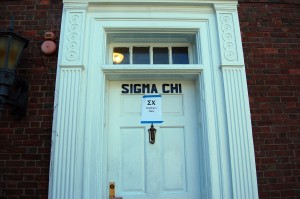By: Antoinette Esce, Editor-in-Chief & Angela Remus, News Editor
Sigma Chi fraternity is currently under investigation for hazing after a Friday, April 19 raid by UR Security at the request of the Office of the Dean of Students and Fraternity and Sorority Affairs (FSA).
“We were able to have enough information [for the allegations] to be of concern,” Director of Fraternity and Sorority Affairs Monica Smalls said, adding that she was not able to disclose who made the allegation.
A Sigma Chi pledge who wished to remain anonymous said that the pledges have “no idea who tipped off [the University].”
“We received notification from persons in the Dean of Students office and [FSA] that they had concerns given some information they had received, indicating that there may be violations of UR policy,” UR Security Assistant Director of Investigations and Staff Development Dan Lafferty said.
Lafferty is running the investigation of Sigma Chi.
“Security people went to the house after we determined we weren’t able to locate them in any other way,” Lafferty said. “We decided that was the place that we were most likely to find them.”
According to the same pledge, Security entered the Sigma Chi house on the Fraternity Quadrangle just after 11 a.m. The officers singled out two pledges first and “fast walked them to the Security vans,” then escorted the rest of the pledges and brothers, some still asleep in their room, to the vans, detaining them for questioning. The event was completely unanticipated by both the pledges and brothers of Sigma Chi, although the pledges were told by Security that the brothers were aware of the situation. So far, Security has conducted 17 individual interviews of pledges and brothers.
“They lied to us and were ultimately very deceitful,” the pledge said, citing incidences of potential misconduct such as lengthy detainment, the confiscation of mobile phones, and threats of expulsion and severe disciplinary actions that technically only the Dean of Students Office can enact. Security officers also refused to tell the brothers and pledges when they would be allowed to leave, causing many of them to miss class. Although the pledge said that most of the allegations seemed to be true, Security lied during interrogations, claiming that pledges had confessed to things they hadn’t.
During the course of the investigation, pledges and brothers are not allowed to have any contact with each other, as per an email sent from Kyle Orton, who, according to Dean of Students Matthew Burns, is “acting as Director of Center for Student Conflict Management right now.”
“[This is] providing a formal notice that you must avoid having contact with all active and alumni brothers of Sigma Chi,” the email read. “These prohibitions form what is known as an Active Avoidance Order (AAO). The AAO has been issued by the Dean of Students Office due to an investigation regarding recent hazing allegations… Should you fail to meet the requirements of the AAO, further disciplinary action may be taken.”
Orton is overseeing the adjudication of the case at the moment, but should the case be appealed, Burns will oversee the process.
“The investigation will continue until I determine there is no further information to gain from interviews,” Lafferty said.
The Dean’s office can also decide when to stop the investigation. With each set of interviews completed, the information is compiled in a report and sent to the Dean of Students’ office, which will “determine if there are grounds for disciplinary action,” Lafferty said.
This case is not the first of its kind.
Smalls emphasized that she could not speculate on the outcome of the investigation, but did mention the two previous cases of hazing that have occurred in the last five years — Alpha Delta Phi fraternity and Psi Upsilon fraternity.
“For both of those, the result was disaffiliation for a number of years,” Smalls said. “Each case is reviewed individually: what exactly happened, the severity of the event, [and] the history of discipline of the organization. It’s very individualized.”
According to a source close to the Alpha Delta Phi incident who also wished to remain anonymous, interviews were conducted by security in an intimidating manner, similar to their alleged conduct in the Sigma Chi case, and “regardless of the intent of the investigators, interviewees were under duress.”
Both Alpha Delta Phi and Psi Upsilon are now returning as full-fledged organizations on campus, and Burns assures that the administration is “supporting them to become more positive and make sure that this doesn’t happen again.”
“We have had issues [with hazing] in the past,” he said. “And it doesn’t stop with Psi Upsilon and Alpha Delta Phi.”
The case of Sigma Chi is still up in the air, and much remains to be determined as the investigation continues.
“We are fully cooperating with [UR] and [FSA]. We respect and appreciate the efforts of University officials,” Sigma Chi said in a general statement to the Campus Times.
A member of the executive board of Sigma Chi who wished to remain anonymous said that “barring any actions the University administration takes to prevent our operations,” the current pledges will be initiated.
When asked if he still wanted to be a brother of Sigma Chi, the same anonymous pledge said, “absolutely.”
He claimed that they were never forced to do anything dangerous like drinking or drugs nor forsake any “moral beliefs.”
The pledging process is designed to encourage pledge class bonding and introspection on Sigma Chi ideals and involves spending substantial time at the Sigma Chi house with pledges and brothers and sometimes sleeping on the house floor as a group.
The University Code of Conduct defines hazing as “any action taken or situation created, whether on or off University premises, which has the potential to produce mental or physical discomfort, embarrassment, harassment, or ridicule,” and includes examples of prohibited activities such as scavenger hunts, paddling, and “engaging in public stunts and buffoonery.”
“Personally, I wouldn’t call it hazing,” the pledge said. “I believe you need something to promote unity and brotherhood.”
The administration remains wary.
“I think it’s important to know that… hazing is not something students should be supportive of,” Smalls said. “It’s unfortunate that we have to investigate cases of hazing, [and] it’s unfortunate that we’ve had cases of hazing. But I am encouraged that we have organizations that uphold their values, enact their values, and live by their values on a daily basis.”
Whether or not Sigma Chi remains one of those organization is yet to be determined.
“The campus is well aware that there are two [fraternity] houses on the [Fraternity Quadrangle] that don’t have fraternity members in them because those fraternities were found responsible for hazing,” Burns said. “I can’t understand why any organization, whether a part of [an FSA] organization or not, on this campus, would continue with that practice when they see stuff like that happening.”
Esce is a member of the class of 2015.
Remus is a member of the class of 2016.
Additional reporting by Casey Gould, Class of 2014.






